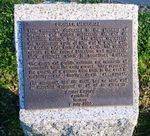
Home » Themes » Landscape » Settlement
Pioneer Settlers of Seymour & DistrictPrint Page 
In 1836 Major Thomas Mitchell crossed the Goulburn at Mitchellstown and soon afterwards overlanders and other early settlers began to use this crossing place on the Melbourne-Sydney route (now known as the Hume Highway) The mail service between Melbourne and Sydney had been operating for just a year when it was found that a better route was available using the "New Crossing Place".
The Robert Burns Inn was operating there by the end of 1839. In 1841 the Government decided that the new crossing place was the likely spot for a town. Plans were laid before the Executive Council of NSW and Mitchell proposed the name Seymour which was approved on 21 December 1843. The town was named after Lord Seymour, the son of the 11th Duke of Somerset. The Post Office opened on 1 July 1844. The railway arrived in 1872 along with substantial infrastructure to support it, establishing the town as an important rail hub for the Goulburn Valley, the Melbourne - Sydney railway and North Eastern Victoria. It was one of the first Victorian examples of the railway town phenomenon, in the heyday of the railway it employed 400 men and along with their families comprised one-third of the town, or 1500 people. In 1871 the Shire of Seymour was established which also included the towns and localities of Avenel, Mangalore, Tallarook, Whiteheads Creek, Trawool, Hilldene and Northwood. It was proclaimed The Rural City of Seymour in 1993, in 1994 The Rural City of Seymour was abolished and incorporated into the Shire of Mitchell.
Location
| Address: | Crawford & McIntyre Streets, Pioneer Park, Seymour, 3360 |
|---|---|
| State: | VIC |
| Area: | AUS |
| GPS Coordinates: | Lat: -37.021938 Long: 145.140102 Note: GPS Coordinates are approximate. |
Details
| Monument Type: | Monument |
|---|---|
| Monument Theme: | Landscape |
| Sub-Theme: | Settlement |
| Designer: | Serdar Baycan |
Dedication
| Actual Monument Dedication Date: | Friday 7th July, 2000 |
|---|
Pioneer Memorial
This memorial, dedicated to the pioneers of
Seymour and District represents life and its
transition through time. The ellipse represents
the continuous cycle of life, and is angled with
its leading edge buried in the earth. The vertical
spaces in the curved bluestone wall represents
life`s progress which is sometimes broken.
The rough cut granite columns are remnants of
surrounds from early graves. They represent
the growth of a person from birth in the east to
maturity and finally death at sunset.
The memorial, like life itself, has no roof, and
is therefore exposed to all of its elements
Serdar Baycan
Architect
Tectura
7 July 2000






